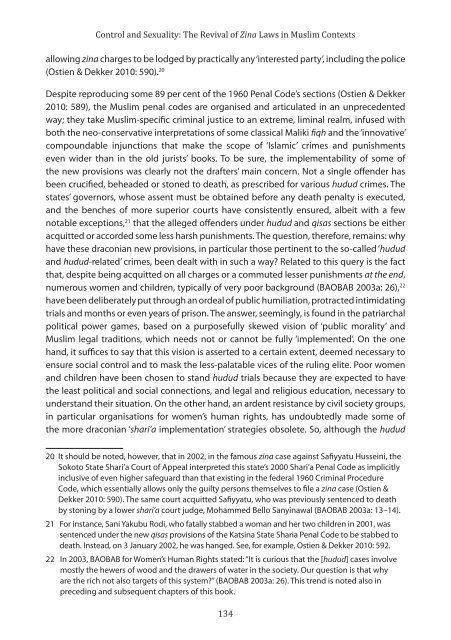control and sexuality
control and sexuality
control and sexuality
- No tags were found...
Create successful ePaper yourself
Turn your PDF publications into a flip-book with our unique Google optimized e-Paper software.
Control <strong>and</strong> Sexuality: The Revival of Zina Laws in Muslim Contextsallowing zina charges to be lodged by practically any ‘interested party’, including the police(Ostien & Dekker 2010: 590). 20Despite reproducing some 89 per cent of the 1960 Penal Code’s sections (Ostien & Dekker2010: 589), the Muslim penal codes are organised <strong>and</strong> articulated in an unprecedentedway; they take Muslim-specific criminal justice to an extreme, liminal realm, infused withboth the neo-conservative interpretations of some classical Maliki fiqh <strong>and</strong> the ‘innovative’compoundable injunctions that make the scope of ‘Islamic’ crimes <strong>and</strong> punishmentseven wider than in the old jurists’ books. To be sure, the implementability of some ofthe new provisions was clearly not the drafters’ main concern. Not a single offender hasbeen crucified, beheaded or stoned to death, as prescribed for various hudud crimes. Thestates’ governors, whose assent must be obtained before any death penalty is executed,<strong>and</strong> the benches of more superior courts have consistently ensured, albeit with a fewnotable exceptions, 21 that the alleged offenders under hudud <strong>and</strong> qisas sections be eitheracquitted or accorded some less harsh punishments. The question, therefore, remains: whyhave these draconian new provisions, in particular those pertinent to the so-called ‘hudud<strong>and</strong> hudud-related’ crimes, been dealt with in such a way? Related to this query is the factthat, despite being acquitted on all charges or a commuted lesser punishments at the end,numerous women <strong>and</strong> children, typically of very poor background (BAOBAB 2003a: 26), 22have been deliberately put through an ordeal of public humiliation, protracted intimidatingtrials <strong>and</strong> months or even years of prison. The answer, seemingly, is found in the patriarchalpolitical power games, based on a purposefully skewed vision of ‘public morality’ <strong>and</strong>Muslim legal traditions, which needs not or cannot be fully ‘implemented’. On the oneh<strong>and</strong>, it suffices to say that this vision is asserted to a certain extent, deemed necessary toensure social <strong>control</strong> <strong>and</strong> to mask the less-palatable vices of the ruling elite. Poor women<strong>and</strong> children have been chosen to st<strong>and</strong> hudud trials because they are expected to havethe least political <strong>and</strong> social connections, <strong>and</strong> legal <strong>and</strong> religious education, necessary tounderst<strong>and</strong> their situation. On the other h<strong>and</strong>, an ardent resistance by civil society groups,in particular organisations for women’s human rights, has undoubtedly made some ofthe more draconian ‘shari’a implementation’ strategies obsolete. So, although the hudud20 It should be noted, however, that in 2002, in the famous zina case against Safiyyatu Husseini, theSokoto State Shari’a Court of Appeal interpreted this state’s 2000 Shari’a Penal Code as implicitlyinclusive of even higher safeguard than that existing in the federal 1960 Criminal ProcedureCode, which essentially allows only the guilty persons themselves to file a zina case (Ostien &Dekker 2010: 590). The same court acquitted Safiyyatu, who was previously sentenced to deathby stoning by a lower shari’a court judge, Mohammed Bello Sanyinawal (BAOBAB 2003a: 13–14).21 For instance, Sani Yakubu Rodi, who fatally stabbed a woman <strong>and</strong> her two children in 2001, wassentenced under the new qisas provisions of the Katsina State Sharia Penal Code to be stabbed todeath. Instead, on 3 January 2002, he was hanged. See, for example, Ostien & Dekker 2010: 592.22 In 2003, BAOBAB for Women’s Human Rights stated: “It is curious that the [hudud] cases involvemostly the hewers of wood <strong>and</strong> the drawers of water in the society. Our question is that whyare the rich not also targets of this system?” (BAOBAB 2003a: 26). This trend is noted also inpreceding <strong>and</strong> subsequent chapters of this book.134


